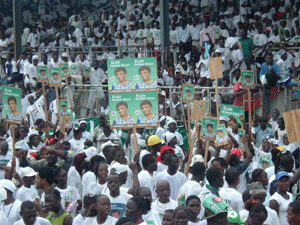
The Final Word: Oh, What A Fantastic Voyage
By Theodore T. Hodge
The Perspective
Atlanta, Georgia
October 10, 2005
| |
By agreeing to settle our differences through elections,
Liberians are experiencing a new day. Although it
took some arm-twisting and a few shoves in the buttocks
by our friends in the international community –
not forgetting the conspicuous presence of the largest
UN peacekeeping force on the continent – we’ve
managed to plan a national election. Within a short
while, the most important phase of that exercise will
end: Ballots will be cast and new national leaders
will emerge.
When the schedule for elections was announced, there
were as many as a hundred candidates vying for just
the presidency. How could so many contestants be eying
one position, many wondered? To many, the very thought
was absurd; others saw it differently, insisting it
was each contestant’s right to run. Such matters
usually get sorted out in a democracy; it did in Liberia.
The final count of presidential candidates is down
to a manageable twenty-two (22).
Let’s examine a bit of history to put this into full perspective: In the first national referendum after Liberia attained statehood, J.J. Roberts became our first president by winning about 97% of the votes cast, according to C.H. Huberich in the book, "The Political and Legislative History of Liberia", (volume 2, 1947). But let students of history be reminded that "Franchise was limited only to some Americo-Liberian males until 1947". (Blaustein and Flanz, “Liberia”, 1971).
The 1952 national election was the first time in
Liberian history that universal suffrage was recognized
in Liberia. In his now famous book, “Liberia:
The Evolution of Privilege”, Professor Gus Liebenow
wrote: “Suffrage, moreover, is now an individual
right in contrast to the past, when a chief, acting
in his corporate capacity as the holder of title to
tribal land could register and vote the members of
his community as a unit. Imagine such outrage for
a moment! It took over a hundred years for indigenous
Liberian citizens and women to earn the right to vote.
Yes, we’ve come a long way!
After J.J. Roberts got about 97% of the votes in the
first election, every other president, including J.J.
Roberts for another stint, got one hundred percent
of the votes, except in two cases: Running for his
third term in 1927, C.D.B. King only managed to get
about 72.5% of the votes cast, with five percent of
the population voting. Again in 1955, W.V.S. Tubman
only managed to collect about 99.5% of the votes cast.
I guess it would be fair to say he was having a bad
year. But his next four terms (1959, 1963, 1967, and
1971) were clean sweeps; netting him 100% of the votes
each time. His successor, William R. Tolbert followed
the tradition of getting a clean sweep in 1975, after
completing Tubman's un-expired term.
During the last national elections held in 1997, Charles
Taylor is said to have won about 75% of the votes
cast. Although international observers declared the
elections free and fair (relatively) there were a
number of obstacles. For example, Taylor had the vast
majority of the country under siege; his opponents
were not allowed to freely campaign throughout the
country. Makes one wonder what exactly was meant by
“free and fair”.
This time around, the landscape has changed dramatically;
all for the better. Imagine this scenario: Two of
the five most popular candidates (referred to many
as the top front runners), George Weah and Ellen Johnson-Sirleaf
could never have become viable candidates until just
about twenty-five years ago: George Weah, because
of his indigenous birth background and Ellen Johnson-Sirleaf
because of her gender.
Bobby Mcferrin, a songwriter and prolific musician
wrote a song that became a popular hit during the
1980’s: “Don’t Worry, Be Happy”.
This should be our theme song.
If I had a chance to console one of the losing candidates
those would be my exact sentiments. To Mr. George
Weah, should he fall short, I would say, for a young
man born and raised in the city slums of Claratown,
could you have imagined reaching such a pinnacle at
age 39? To have amassed such a strong following among
Liberians across all spectrums is itself a notable
achievement. Your life story is a marvelous one, be
proud.
 |
To all the other contestants such as Brumskine, Tubman, Tipoteh and Sherman, (and others too numerous to list), I salute you too. Each of you did your country and your supporters proud. What we expect from all of you is to put away your fighting gear and get ready to pull Liberia up through your collective leadership. This is not a singular, but a collective fight. Yes, the winner shall be named captain, but we expect a team effort to move our country forward. Of course, I hope the team captain will extend that friendly hand to all potential players. That is the challenge that beckons. Are you aboard?
We’ve all become winners. The Liberian nation should be proud and the entire crop of candidates should be thankful for being a part of history; it has undoubtedly been a fantastic voyage. We are living during an exciting time in history, may God bless Liberia.
Of course we must not forget to thank our international partners, we owe them dearly.

